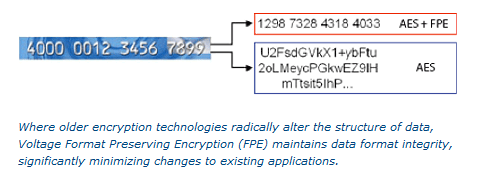Format-Preserving Encryption
Preserving Critical Business Functions by Maintaining Data Format
Format-Preserving Encryption (FPE) is a fundamentally new approach to encrypting structured data, such as credit card or Social Security numbers. FPE makes it possible to integrate data-level encryption into legacy business application frameworks that were previously difficult or impossible to address. It uses a published encryption method with an existing, proven algorithm to encrypt data in a way that does not alter the data format. The result is a strong encryption scheme that allows for encryption with minimal modifications to the way that existing applications work.
FPE’s underlying cryptographic construction was first proposed in 2006 by Voltage’s CTO Terence Spies, and since then, Voltage has been the leader in the development of FPE and related technologies. Voltage holds US Patent 7,864,952 describing the core cryptography behind FPE, and has continued to develop intellectual property surrounding the implementation and use of the technology.
Traditional algorithms turn small, structured data elements, such as 16-digit credit card numbers, into larger, binary fields. As a result, implementing these algorithms typically required massive re-engineering of databases and applications in order to accommodate the modified data sizes and formats.

With FPE, encrypted data will retain its original format, on a character-by-character basis, so that encrypted data “fits” in existing fields, eliminating the need for database and application schema changes.
Key Features and Capabilities:
- Datatype agnostic – Supports data of any format, including numeric, alphanumeric, and even date fields
- Referential integrity – Preserves referential integrity, ensuring consistency across applications and data stores
- Data masking – Can be used to efficiently obfuscate data for development, test, and analytics environments
- Published security proofs – Offers a formal proof of security, recognized by NIST
